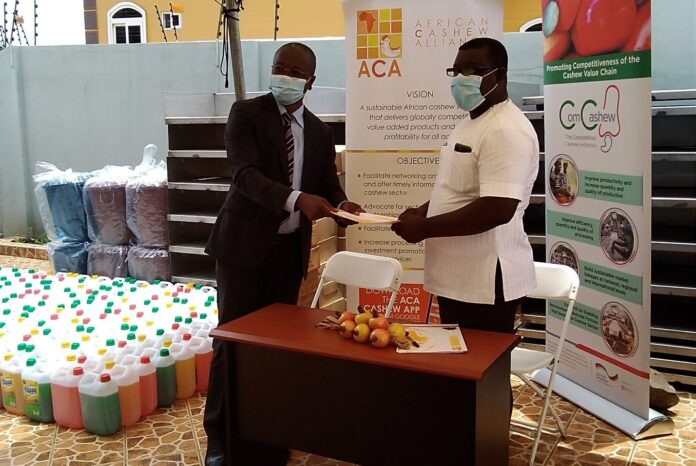
The local cashew processing sub-sector has received a massive boost to sustain operations, amidst threat by the Coronavirus pandemic.
This follows the presentation of COVID-19 relief items to the processors by the African Cashew Alliance (ACA) and its partners to ensure the factories work under a cleaner and safer environment to control the spread of coronavirus.
The relief items worth GH¢539,140 would be shared among all operational cashew processing plants in the country to ensure uninterrupted operations under COVID-19 free conditions. Currently, there are about ten (10) active local processing factories with a total production capacity of about 46,000 metric tonnes. Due to a plethora of challenges, all the factories currently operate below their installed capacities.
The relief materials included 25 pieces of stainless steel tables to promote social distancing at production units, hand thermometers (22), veronica buckets (40), hand dyers (20), aprons (300) and disposable hair nets (635). The rest are sanitizers (4.5 liters, 130 gallons), nose masks (1,430 boxes), paper towel roll (965 pieces), rubbing alcohol (200 gallons), overall coat (30 pieces), hand washing liquid soap (4.5 liters, 630 gallons), paper dispenser (20) and bar soap (100 boxes) among others.
Presenting the items in Accra, Ernest Mintah, Managing Director of ACA, recounted the negative impact of the pandemic on the cashew value chain, and thus, underscoring the need for such intervention to sustain the operations of cashew processors.
He said: “Processors were unable to buy raw materials for processing neither were they able to function adequately with less human resources as the need to observe social distancing arose. Aggregators, on the other hand, could not purchase in large quantities as they did not have big storage facilities to store the produce for long periods, awaiting the full functioning of processing units or reopening of the borders for export.”
The cashew industry across Africa, he observed, has been ravaged by the virus, warranting urgent policy support for the processing sub-sector, availability of adequate working capital financing, and the need to promote local consumption. “Our local processors do not have the adequate working capital financing to purchase raw cashew nuts needed to operate at optimal levels. Absence of modern technology impedes optimal functioning, as factories lack the needed equipment.”
Mr. Mintah commended ACA partners, GIZComCashew and the Swiss Economic Cooperation (SECO) for their unflinching support to ensuring sustainable cashew industry in the country and Africa as a whole.
The Deputy Executive Director of GIZ/ComCashew, Florian Winckler, said in the last ten years, many development efforts have been done to sustain the cashew value chain and increasing its competitiveness. “To enhance the capacity of processors, training programmes such as good manufacturing practices, proper sourcing and warehousing, Cashew master training, record-keeping among others have been organised by the project.”
He added that it has become imperative to support small and medium businesses to stay afloat in the light of the pandemic so as to protect jobs and income. He expressed optimism that the donation would go a long way to help curb the spread of the virus and enable the factories to implement appropriate hygiene protocols during cashew processing.
The President of the Association of Cashew Processors Ghana, Ed-Malvin Nii Ayibontey Smith, who received the items thanked the donors for such massive support. “The donation has really come at the right time. A time when factories are struggling financially to keep pace with the cost of ensuring that all the safety protocols are and will continue to be in place until the battle with COVID-19 is won.”









